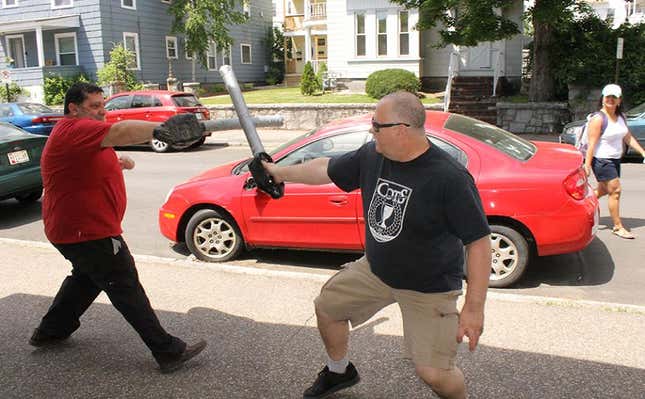Every Sunday morning, dozens of locals gather at a bar in Concord, New Hampshire to eat pie and fight each other with foam swords.
They call themselves the Church of the Sword, and in lieu of worshipping a higher being, the five-year-old institution preaches self-ownership and self-defense. Its hymnals are called “jams,” it lets followers keep several other faiths, and its customs—like the Ritual of Combat, in which service-goers duel with each other with fake swords to symbolize the defense of personal opinions—may seem more like eccentric social club activities than sacred rituals.
Yet the church, which has 280 members, is fighting to be legally recognized as a religion. The group recently sued the town of Westmoreland (where it is based) for denying it a religious tax exemption on a property donation. It lost: according to the town and the county court that decided the case, the organization doesn’t qualify for tax breaks because it’s political, godless, and simply not a real religion.

The group is now appealing its case to the New Hampshire Supreme Court. In oral arguments Thursday (Oct. 15), the church claimed Westmoreland’s definition of “religion”—as a group that must have a spiritual leader and worship a universe-creating supernatural power—is discriminatory.
“We are definitely a religion,” Kevin Bloom, the organization’s senior pastor and the owner of the bar where members regularly assemble, tells Quartz. “We’ve met every week for five years, we meet the majority of the [Internal Revenue Service’s] 14 points for defining a church.”
Members of the church, some of whom are libertarian activists who migrated to New Hampshire together, believe that upholding personal learning and self-improvement is just as spiritually valid as worshipping a deity. Like many established religions, the church runs educational programs, memorial services, weddings, counseling, and philanthropic activities. Above all, it fosters a stringent set of shared values, Bloom tells Quartz.

But under the law, Westmoreland reserves the right to determine whether or not a group counts as a religion for tax purposes. If the Church of the Sword loses the appeal, it would owe $3,200 per year in taxes on the donated house, which members consider a parsonage.
The town is adamant that the church is a social organization, chiefly because it doesn’t believe in a supreme being.
Bloom says that’s a narrow-minded view. “They’re essentially saying Daoism and Buddhism can’t be religions, either,” he says. “If the New Hampshire Supreme Court comes up with a standard that excludes us, we’ll go to federal court immediately.”
Several other religiously-oriented organizations are facing similar battles over government recognition, including two more in New Hampshire. If the Church of the Sword wins the suit, it would set a precedent for other unrecognized churches across the state to get tax relief, too.
In 2013, the UK’s highest court made a landmark decision that believing in a god is not essential to a religion—and the coming months will tell whether a US state is willing to say the same.
